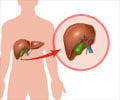Liver regeneration can be spurred after surgery with a newly found drug, as published in a paper in The Journal of Experimental Medicine.

Complement inhibitors effectively dampen IRI, but the benefits of this approach come at a cost, as certain complement proteins are also required for liver tissue to regrow. A group of scientists at the Medical University of South Carolina now show that a novel complement inhibitor reduces complement-mediated liver cell death and actually stimulates post-surgery liver regrowth in mice. The novel inhibitor limited the deposition of complement proteins and promoted the division of new liver cells. Even after removal of as much as 90% of the liver, treatment increased survival from 0% in untreated animals to an impressive 70%.
The selectivity of this novel complement inhibitor, and its unexpected ability to promote liver regeneration, suggests that it might represent a new treatment strategy for a variety of liver injuries in humans.
Source-Eurekalert















